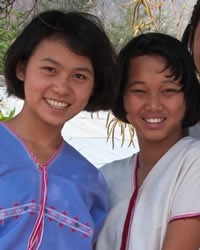The Sqaw (or S'gaw) Karen tribe inhabits the mountains and jungle valleys of eastern Myanmar (formerly known as Burma). They have lived there for thousands of years and are thought to be the original inhabitants of the region. They are the largest of the Karen tribes, numbering over two million people. Though most live in Myanmar, some have fled to Australia as refugees.
The Karen people in Australia, primarily settled in Victoria, especially in areas like Wyndham, Hobsons Bay, and Bendigo, have built a vibrant and resilient community rooted in cultural preservation, family values, and adaptation to Australian life. Most Karen Australians arrived as refugees from Myanmar (Burma) after decades of persecution and displacement, often spending years in refugee camps along the Thai-Burma border before resettlement.
Family is central to Karen culture. Traditionally, Karen society is matrilineal, meaning the husband joins the wife's clan after marriage. Gender roles are evolving. While men traditionally provided financially and women cared for children and managed the household, many Karen women now work outside the home, and men help with child-rearing.
Elders are highly respected, often consulted for their decisions, and regarded as the keepers of traditional knowledge. It is common for ageing parents to live with their adult children, and placing elders in aged care facilities is generally avoided due to cultural guilt.
Child-rearing practices include extended family involvement. Infants are typically breastfed for 1.5 to 3 years, and postpartum care includes traditional practices like resting by a fire and avoiding bathing for several days.
Community organizations and churches play a key role in job readiness, language learning, and settlement support.
Cultural identity is preserved through festivals like Karen National Day and Karen Revolution Day, as well as through language, traditional dress, and community events.
The Karen community values modesty, calmness, and respect for others, which influences their communication style and social interactions.
Karen people often combine traditional herbal remedies with Western medicine.
Mental health is a sensitive topic, and many prefer to seek support from religious leaders or community elders rather than formal counselling. Health professionals are encouraged to use same-gender interpreters and be mindful of cultural beliefs around health, such as the balance of "hot" and "cold" elements.
The Lord has pursued the Karen people for a long time, and the first Christians among them came to faith in the 1800s. Today, there are many Sqaw Karen believers, but they have been isolated from the rest of the world and decimated by the brutal Burmese military junta. The majority of Karen Australians are Christian, though some are Buddhist or hold Animist beliefs.
Many Karen adults in Australia face challenges in employment due to language barriers, limited formal education, and unfamiliarity with Australian systems. However, younger generations are increasingly pursuing higher education, vocational training, and careers in community services, healthcare, and education.
Pray for a multiplying movement of disciples who will bring healing, unity, and lasting hope, transforming entire villages through the power of Christ.
Pray that soon they will become Christ's ambassadors to disciple less-reached nations.
Pray for the Lord to bless S'gaw Karen Christian believers with an abundance of God's love, joy, and kindness, drawing others to the King of kings.
Pray for them to be grateful for God's spiritual and physical provisions.
Pray that the Holy Spirit will move powerfully, so that they may become a light to those who still lack a relationship with Jesus Christ.
Scripture Prayers for the Karen, S'gaw in Australia.
Asian Harvest
AI generated by Copilot
| Profile Source: Joshua Project |










